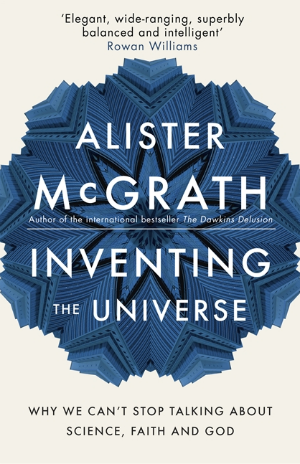Inventing the Universe by Alister McGrath
Why we can't stop talking about science, faith and God
 Inventing the Universe
Inventing the Universe
By Alister McGrath
Hodder and Stoughton
ISBN 978 1 444 79845 6
Reviewed by John Biggs
Yet another book on the tensions between science and faith? Early in Inventing the Universe McGrath quotes the Spanish philosopher Jose Ortega: “Scientific truth is characterised by its precision and the certainty of its predictions. But science achieves these admirable qualities at the cost of remaining on the level of secondary concerns, leaving ultimate and decisive questions untouched."
McGrath believes an attitude that sets science and faith in conflict with each other is now dated. Rather, if we are to do justice to the complexity of the world, we need a richer and deeper level of discussion to do justice to its reality.
He uses his own journey from atheism to Christian faith as a framework: this is a personal testimony of what happens when science and faith are allowed to critique and enrich each other.
If the reader finds some of the argument a little difficult to follow – though throughout it has to be said this is a text beautifully and clearly written – then take a tip from those who cheat by reading a detective story’s last chapter first; here the first half of the last chapter makes clear the objective in view. Our universe is just too rich to be exhaustively described by one tradition of investigation or one angle of approach.
McGrath is unsympathetic to any dogmatic views that “have no place for the tentativeness, open-mindedness and, above all, the intellectual humility which (are) the characteristic of both science and religion at their best”. It follows that the likes of Daniel Dennett and Richard Dawkins and other “new atheists” are treated to unremitting criticism.
McGrath joins with Mary Midgeley, who is much quoted in this book, who pointedly asks “How could anyone know the universe is meaningless? How would they show that it has no purpose?”
The metaphors used are wide. No single way of thinking is adequate to explain, on its own, the meaning of our universe, a number of different conceptual tool-boxes have to be used together, a rich palette of colours is needed to “interweave the narratives” so as to represent and enjoy it.
There is a useful chapter on Darwin and Evolution and the implications for faith. McGrath’s reading is staggeringly wide in science, philosophy and religion. He has done the hard work for us, and the result is both informative and stimulating.
John Biggs is a former President of the Baptist Union
Baptist Times, 03/06/2016